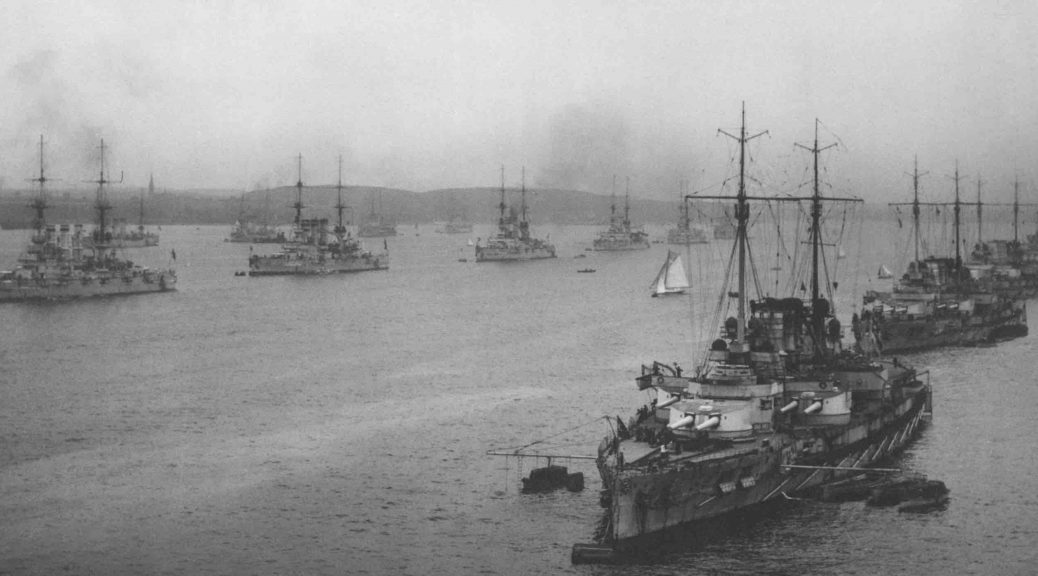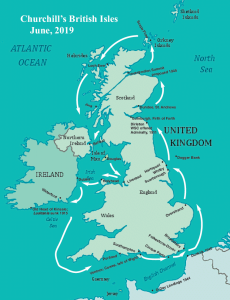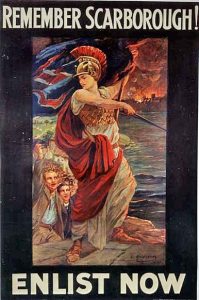
Churchill Remembered on the Hillsdale College Cruise (1): Yorkshire, 1914
Shelling Yorkshire, 1914: “Naturally there was much indignation at the failure of the Navy to prevent, or at least to avenge, such an attack upon our shores. What was the Admiralty doing? Were they all asleep?… We had to bear in silence the censures of our countrymen.”
Britain’s East Coast: Churchill Connections, June 1st to 3rd
The 2019 Hillsdale College Cruise around Britain offered a unique opportunity to recall the Churchill saga by passing or visiting key places, starting with English Channel and North Sea venues from Southampton to Yorkshire to Edinburgh. These venues shaped and affected Churchill’s thought and engaged his pen.
 From the Isle of Wight, where Churchill’s parents met in 1874, we are reminded of his adventures during the two greatest wars in history. Many places associate with his command of the Royal Navy, twenty-five-years apart, in both World Wars.
From the Isle of Wight, where Churchill’s parents met in 1874, we are reminded of his adventures during the two greatest wars in history. Many places associate with his command of the Royal Navy, twenty-five-years apart, in both World Wars.
In this series of posts we highlight the Yorkshire coast, shelled by Germany in December 1914. Then Scapa Flow and Loch Ewe, where Churchill—First Lord again, twenty-five years later—visited the Grand Fleet in 1939. Finally Portland, from which Churchill, First Lord of the Admiralty, sent the entire British fleet to its war station in July 1914. The three locations illustrate and inform on Churchill’s words and actions in defense of liberty.
Southampton (June 1st)
Winston Churchill’s parents met at the Cowes Regatta, Isle of Wight, in 1873. Island venues grand and small include Queen Victoria’s beloved Osborne House; and the Everest house in Ventnor, where young Winston witnessed the sinking of the Eurydice in 1880. Visitors to the south of England will find several days worth of Churchill exploration on the Isle, and may recall a notable event off Portland in July 1914 (see part 3 in this series).
English Channel and North Sea (June 2nd)
This year marks, with suitable ceremony, the 75th Anniversary of Operation Overlord, the invasion of France, on D-Day, 6 June 1944. On the Hillsdale cruise, one of my lecture topics is the myth that Churchill opposed D-Day. According to one film, his resistance lasted virtually until the ships sailed. This is the sort of nonsense up with which we shall not put.
Farther along we pass the Cinque Ports, Hastings, Rye (New Romney), Hythe, Dover and Sandwich. Churchill held the ancient and honorary title Lord Warden of the Cinque Ports, from 1941 to his death. (His successor was Queen Elizabeth the Queen Mother.) Among other things, the Lord Warden was entitled to and responsible for all whales washed up along this section of coast. The prospect quite alarmed Churchill, who thought he might be required to remove the carcasses!
Kent and Norfolk
Folkestone, Kent marked the farthest extent of World War II cross-channel shelling (1943). At nearby Dover Castle Admiral Bertram Ramsay fixed his headquarters for Operation Dynamo, the Dunkirk Evacuation (1940). Broadstairs, Kent, was for a time Field Marshal Montgomery’s headquarters. It was also where little Marigold, the Churchills’ fourth child, died of septicemia at the age of 2 1/2 in 1921.
The Churchills holidayed at Pear Tree Cottage, Overstrand, Norfolk as war clouds gathered in July 1914. Winston was hastily recalled to London, and soon after sent for his family. Fears rose of a German attack on the Norfolk or Yorkshire coasts. Sure enough, German cruisers shelled Scarborough, Whitby and Hartlepool, spurring Churchill to action (December 1914). To his disappointment, a decisive encounter did not materialize (see below). In January 1915 came another inconclusive naval confrontation, the Battle of the Dogger Bank.
Edinburgh (June 3rd)
Approaching Edinburgh along the coast of East Lothian, we pass Dirleton. Here was the Scottish home of Prime Minister H.H. Asquith, who offered young Winston the Admiralty in 1911. Edinburgh is home to the retired Royal Yacht HMY Britannia, the Scottish National War Museum, and numerous other Churchillian venues.
Leaving Edinburgh is the Firth of Forth fleet anchorage. Here Admiral David Beatty on his flagship watched the proud German High Seas Fleet sail in to anchor and surrender at the end of World War I. Here too, in 1919, the German crews opened their ships’ seacocks and simultaneously scuttled their fleet in a brave act of defiance.
Remembering Yorkshire, December 1914: The Perils of Silence
 On 16 December 1914, elements of the German High Seas Fleet bombarded three Yorkshire coastal towns. The result was 592 casualties, mostly civilians, of whom 137 died.
On 16 December 1914, elements of the German High Seas Fleet bombarded three Yorkshire coastal towns. The result was 592 casualties, mostly civilians, of whom 137 died.
British Intelligence had known that German ships had sailed from their home ports two days earlier. But the Royal Navy had to patrol 500 miles of coastline, whereas the enemy could strike where it wished. The Germans opted for Yorkshire. Upon hearing of the German action, Churchill despatched a British squadron, led by Admiral Beatty in HMS Lion. As the British arrived, the German ships retired at flank speed for home, avoiding a decisive engagement. In The World Crisis, Churchill regretted how little the public knew. The Admiralty could only issue a vague communiqué….
This morning a German cruiser force made a demonstration upon the Yorkshire coast, in the course of which they shelled Hartlepool, Whitby, and Scarborough. A number of their fastest ships were employed for this purpose, and they remained about an hour on the coast. They were engaged by the patrol vessels on the spot…. Sighted by British vessels, the Germans retired at full speed, and, favoured by the mist, succeeded in making good their escape. The losses on both sides are small, but full reports have not yet been received….
Public Opprobrium
Outrage in Yorkshire fell hard against Churchill, who vowed to force the Germans back out if he had to dig them out “like rats in a hole.” This proved an ill-judged remark. For the entire course of the war, the High Seas Fleet never massed for a climactic battle, near Yorkshire or anywhere else. His enemies often flung Churchill’s words back at him in derision. Later, Churchill expressed his frustration in The World Crisis:
Naturally there was much indignation at the failure of the Navy to prevent, or at least to avenge, such an attack upon our shores. What was the Admiralty doing? Were they all asleep?… We had to bear in silence the censures of our countrymen….
One comfort we had…. The sources of information upon which we relied were trustworthy. Next time we might at least have average visibility. But would there be a next time? … On the other hand, the exultation of Germany at the hated English towns being actually made to feel for the first time the real lash of war might encourage a second attempt. Even the indignation of our own newspapers had a value for this purpose. One could only hope for the best. Meanwhile British naval plans and secrets remained wrapped in impenetrable silence.






